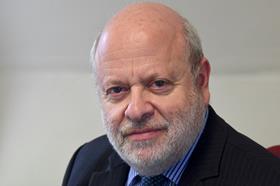The scandal threatening the future of the CBI raises one of two current questions facing membership organisations such as the Law Society. It should make us ask whether our own organisation’s systems are robust enough to encourage an environment where people can both work easily with each other and also call out wrong behaviour.

And there is a second question, raised recently within the American Bar Association, as to whether all lawyers feel represented by their professional body.
To start with the CBI, none of what follows is a comment on the CBI’s circumstances, about which I know little. But I do know that at the Law Society great care is taken to ensure there is an appropriate culture and management of risks. A culture code is circulated before every meeting, which includes the statement that ‘We call out behaviour that doesn’t support our culture’. There is an audit committee of the Board, which looks at risks, and risk of all sorts is frequently discussed. The governance of the organisation is investigated from time to time by outsiders.
None of this can ensure that bad incidents do not happen. The policing of culture depends on the courage and judgement of many individuals, and the promotion of a sound whistleblowing policy. It is not easy to call out the bad behaviour of those with whom we work. However, it is clear that we all need to continue to be vigilant about culture, values and whistleblowing, in whatever organisation we find ourselves.
The second question, about representation of all members, arises out of the left-right split in views, exhibited daily in the culture wars, which creates a fine line for any membership organisation to tread. A recent litmus test in these wars involved Dominic Raab. Was he brought down by a ‘Remoaner’ mob of obstructive civil servants or was he a plain bully? More pertinently for the Society in terms of the policy issues that form part of its mandate, should the Law Society be issuing guidance on climate change (yes, very much so, in my view), or is it another sign of an organisation gone ‘woke’, out of touch with member needs?
The answers to questions such as these seem plain to us, depending on which side of the line we stand. A membership organisation must make sure that each side – each side with a responsible and rational point to make – is able to speak its mind openly and with respect.
A law professor from the right recently wrote an article pointing out that the membership of the American Bar Association (ABA) has fallen significantly over recent years. Although he submits various reasons – the unwillingness of young attorneys to join civic organisations, or the dues being too high for the benefits obtained – he believes that the ABA consistently skews to the political left, which alienates conservative lawyers.
He cites various problems which this has caused the ABA, including the discontinuance of the previous practice whereby the ABA is given advance notice by the government of judicial candidates in order to vet them before nomination.
He believes that a professional organisation should represent the mainstream views of all the profession. He proposes therefore that:
- a professional organisation should not be a locomotive, barrelling forward for progressive ends, but rather a caboose trailing behind the profession, codifying best practices once there is a consensus; and
- diversity should be accepted to include ideological diversity.
- do not in principle agree with his first proposal, since leadership is sometimes required on, say, new issues.
Regarding the second, we know that in our country there is now a debate, promoted again by the right, that the establishment is too liberal and that voices from the right are drowned out. Many dispute this, pointing for instance to the viewpoint of the popular tabloid press and indeed of the current government. I will not go into the detail here, but the debate exists, and the Society should be aware of it. It may in the future cause reputational problems.
One way to avoid the difficulty is to ensure the widest possible representation of the profession in the Society’s work. To this end, there was an advertisement in last week’s Gazette inviting solicitors to help shape the priorities of the Society by joining one of its policy committees. The committees help identify key priorities for the profession and ensure that the Society focuses on what matters most to solicitors.
At the same time, the Society is also in the throes of developing a system to ensure that even more members of the profession become active in its work, through its first volunteering strategy called Get Involved.
It is only by taking active steps – on values and outreach – that a membership organisation can navigate the tricky waters in which they find themselves.
Jonathan Goldsmith is Law Society Council member for EU & International, chair of the Law Society’s Policy & Regulatory Affairs Committee and a member of its board. All views expressed are personal and are not made in his capacity as a Law Society Council member, nor on behalf of the Law Society































2 Readers' comments